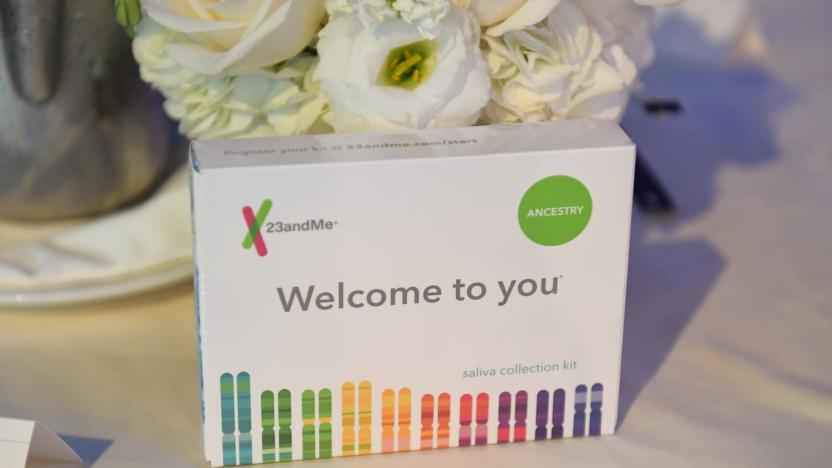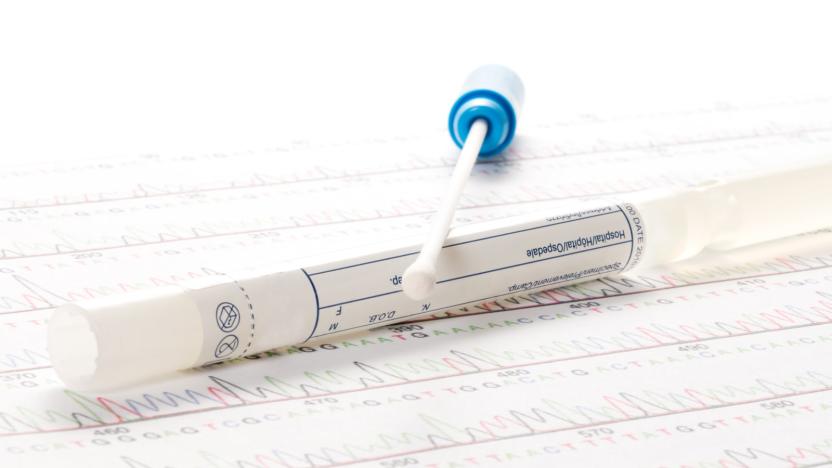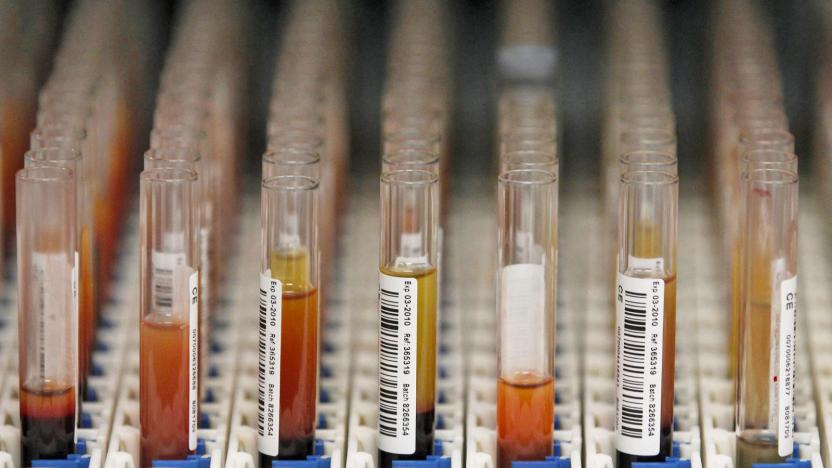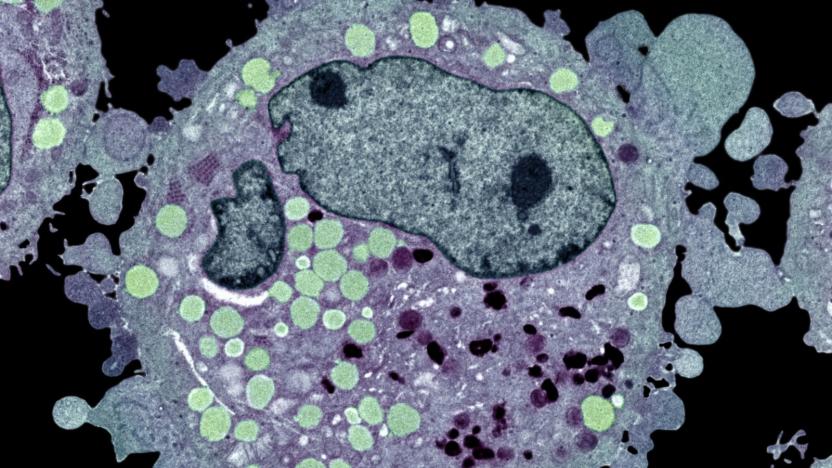23andMe
Latest

DNA is just another way we can’t opt out of data sharing
Growing up in California, serial killers are as much a fact of life as year-round citrus or having a bit of Spanish in your daily vocabulary. News of the Golden State Killer's arrest came as a surprise and a relief to most of us whose early lives were shaped by a generation of fear. The Golden State Killer raped at least 51 women and killed 12 people (that we know of). Our parents literally slept with guns and knives under the killer's shadow, and the many others like him.

Investigators used online DNA databases to hunt Golden State Killer
Yesterday several police departments in California announced the arrest of the "Golden State Killer," who killed a dozen people between 1978 and 1986 and has been accused of over 50 rapes. At the time, investigators said DNA played a role in identifying former Auburn, CA police officer Joseph James DeAngelo, and today went a step further with the explanation. The LA Times and New York Times report that investigators took DNA samples from the old crime scenes and plugged them into online databases, looking for familiar matches that would help narrow down the suspect. The Olympian reports that by combing through family trees of partial matches they focused on DeAngelo, who was the right age and had lived in some of the areas. Before arresting the subject they got a DNA sample from something DeAngelo had discarded and checked for a match. That match led to his arrest and charges for two of the murders, with more expected to follow.

FDA greenlights 23andMe's direct-to-consumer cancer risk test
Cancer screening isn't all that accessible -- you typically need an obvious genetic background that suggests you're at risk, which doesn't help if you slip between those cracks. You shouldn't have to run that gauntlet for much longer. The US Food and Drug Administration has approved a 23andMe direct-to-consumer test that details the risks of breast, ovarian and prostate cancer based on BRCA1 and BRCA2 genetic mutations. Once the report is available, you wouldn't have to worry about qualifying for a screening -- you could send in a saliva sample and find out on your own terms.

23andMe now paints a far clearer picture of your DNA ancestry
To date, 23andMe's Ancestry Composition report could trace your genetic roots back to 31 populations. That's decent, but not exactly the most accurate representation of your lineage. It could soon be more accurate, however. The company is updating its methods to trace ancestry back to 120 more populations, for a total of 151. If you have uncommon origins, you might have a better chance of discovering them.

The FDA just changed how it reviews genetic health risk tests
FDA Commissioner Scott Gottlieb announced new rules today regarding direct-to-consumer genetic health risk (GHR) tests and the process by which they're approved for sale. In a statement, Gottlieb explained that these sorts of tests can provide more and more information as the technology develops, information that is not only in demand but could also serve as a useful medical tool. "These tests can prompt consumers to be more engaged in pursuing the benefits of healthy lifestyle choices and more aware of their health risks," said Gottlieb. "Consumers are increasingly embracing genetic health risk testing to better understand their individual risk for developing diseases."

Color's breast and ovarian cancer DNA test is $99 through October
During Ovarian Cancer Awareness Month (September) and Breast Cancer Awareness Month (October), genetic testing company Color is reducing the price of its new BRCA Test. The test -- which looks for mutations in the BRCA1 and BRCA2 genes that are linked to breast and ovarian cancer -- has a regular price of $149, but for this month and the next, customers can get it for $99.

23andMe study focuses on why we experience pain differently
We all experience pain differently, and what's excruciating for you might not even be worth mentioning for another. There are studies that looked into the difference in pain tolerance between individuals and some even found associations between people's pain tolerance and their gender and ethnicity. 23andMe wants to have an even deeper understanding of pain tolerance and to finally figure out what role genetics play in both temporary and chronic pain. That's why it has teamed up with German-based pharmaceutical company Grünenthal to conduct one of the largest studies of its kind.

FDA clears 23andMe to warn you about potential health risks
Good news for everyone who wants to do at-home DNA tests: 23andMe has been cleared by the Food and Drug Administration to tell customers if they're at risk for 10 potentially debilitating diseases. "These are the first direct-to-consumer tests authorized by the FDA that provide information on an individual's genetic predisposition to certain medical diseases or conditions, which may help to make decisions about lifestyle choices or to inform discussions with a health care professional," the watchdog agency said in a statement. Previously, the FDA had stopped the company from offering this information back in 2013. The FDA softened its stance a bit in 2015.

23andMe stops work on advanced gene sequencing
The team at 23andMe is dialing back some of its grander plans for DNA analysis. Co-founder Anne Wojcicki has confirmed to BuzzFeed News that her company has stopped working on next-generation sequencing that would reveal much more about your genes, such as the potential for some diseases. The executive is quick to stress that this isn't due to financial or regulatory trouble -- rather, it's a question of whether or not that data is useful enough to warrant 23andMe stretching itself thin at this point. The firm would rather focus on its "core business" right now, Wojcicki says.

23andMe health study needs 5,000 Nevada volunteers
A year after the FDA loosened limitations on what genetic analytics company 23andMe could offer consumers, the company is embarking on a groundbreaking study of 5,000 people across Nevada. In partnership with the not-for-profit healthcare provider Renown Health and the Desert Research Institute (DRI), the survey will combine health, population, genetic and environmental data for a comprehensive look at the various influences nature and nurture have on people's wellness.

23andMe helps identify genetic links to common skin cancer
The team at 23andMe is clearly going out of its way to show that huge amounts of volunteered genetic data can boost medical research. Scientists at both 23andMe and Stanford used data from consenting customers to conduct the largest ever genetic study of basal cell carcinoma, the most typical form of skin cancer, and made numerous discoveries. They found 14 previously unidentified genetic associations with the cancer, some of which might pinpoint when you're at increased risk. Some gene regions linked to basal cell carcinoma have a larger effect on the young, hinting that environmental factors might play a greater role in getting the cancer as you age. Also, a gene marker's interactions suggest that your risk goes up when you have black or brown hair, and gene areas that maintain telomeres (chromosome ends) played their own part.

23andMe data helps find genetic factors behind depression
Genetic samples from 23andMe users have contributed to scientific discoveries before, but never quite like this. Researchers have used gene samples from 307,354 23andMe customers to identify 32 genetic factors (15 genetic loci and 17 nucleotide polymorphisms) linked to major depressive disorder among people of European descent -- the largest-ever study of its type. The data hints that genes responsible for developing neurons may correspond to those triggering this form of depression, and that the genetic areas associated with depression may play a part in other mental disorders, such as schizophrenia.

23andMe says being a morning person is in your genes
Are you the sort of person who wakes up with the Sun? You might not just have a go-getter attitude to thank for it. The genetics firm 23andMe has published a study which suggests that variances in 15 regions of the human genome (including seven that influence circadian rhythms) affect the likelihood that you're a morning person. No one area instantly flicks the switch, but it adds up -- the more your genes skew a certain way, the more likely you are to think that 6AM is a perfectly reasonable time to hop out of bed.

23andMe given permission to offer some limited health reports
23andMe has been given the green light to resume some, but not all, of the health reporting that the FDA prohibited it from carrying out in 2013. The startup launched with the pitch that a sample of your saliva was enough to tell you where your ancestors came from as well as if you would go bald in old age. Controversially, the company also told you if you were at risk of a wide variety of diseases, but never asked for permission to do so. That's why regulators shut it down, since the outfit was unable to supply the data to prove that the tests were accurate.

23andMe data helps shed light on common cause of female infertility
Biotech company 23andMe is very open about the fact that it offers your genetic data from its DNA test kits to researchers -- with your consent, of course. Now, its contribution to a genetic study about polycystic ovary syndrome (PCOS), a common cause of infertility in women, has paid off. The study conducted by researchers from the University of Cambridge and other institutions has revealed more pertinent information about the disorder. Out of the 200,000 women whose information were used, 87,000 were 23andMe customers. A total of 5,000 women from the customer pool have the condition, while the rest don't and were used as control.

23andMe plans to use your genetic data to create new drugs
For over a year now, 23andMe has been stuck in a regulatory quagmire with the US Food and Drug Administration (FDA). Although it's still able to sell its personal DNA kits, the company is effectively banned from offering health-related genetic tests in the US. A few weeks ago it was given the go-ahead for a single check, a rare disorder called Bloom syndrome, but it's only a small step towards the broader health reports it provided before. While it waits for wider FDA approval, 23andMe has decided to enter the drugs market. The company already works with major pharmaceutical firms including Pfizer and Genentech, but now it's prepared to go it alone. The startup has accrued a vast amount of health-related information from its users, so there's an obvious opportunity to apply that database to the field of medicine. Instead of just looking for health-related ailments, and offering users the results, 23andMe wants to go one step further and develop the cures too.

23andMe gets FDA approval, but only to test rare Bloom syndrome
For over a year now, 23andMe has been effectively banned from offering its US customers health-related genetic tests. The company is still selling its personal DNA kits, but the information it can provide is limited to ancestry-related reports and raw genetic data. The US Food and Drug Administration (FDA) was behind the original clampdown in 2013, but this week it's given the company its blessing for a new test. With the fresh approval, 23andMe can now offer to look for signs of Bloom syndrome, a rare disorder which is characterized by short stature, sun-sensitive skin and increased cancer risk. While this is a specific test, rather than the broader health reports it offered before, 23andMe calls it an "important first step" to offering detailed genetic advice in the US once more.

23andMe will offer your genetic data to researchers (with your consent)
The genetic samples you send to 23andMe aren't just useful for discovering your roots or potential illnesses -- they could soon help pharmaceutical research, too. The company has struck a deal that opens its DNA research platform to Pfizer's scientists, letting them use the data to quickly find links between genes and certain conditions or traits. The two firms will also partner on genome-level studies and trials, such as one that will ask for 5,000 volunteers to help understand the genetic properties of lupus.

23andMe's £125 DNA testing service launches in the UK
While more and more technology companies are shifting their focus to include health tracking, none go quite as in-depth as 23andMe. The self-branded "personal genetics company" made its name in the US and Canada for mail-order DNA test kits that provide customers with an overview of their genetic ancestry and provide a risk assessments for certain diseases based on genetic data. That was until its very public spat with the Food and Drug Administration (FDA), which told 23andMe to stop offering disease analysis until it received the medical device classification it needed. The ban is still in place, but 23andMe has continued to offer (with approval) its ancestry-related reports and "uninterpreted raw genetic data" to customers.

Google-backed 23andMe gets public money for DNA research
Genetic testing firm 23andMe might not be on good terms with the FDA, but it impressed the National Institutes of Health enough for the agency to give it a $1.4 million grant. The money will be used for a two-year project that'll improve the firm's web-based genetic database and make data available (anonymously, that is) for use by external researchers. This will also allow the company to look into the association between genes and health conditions, conduct more extensive surveys to collect data, among other things that it details on its official announcement.









